You are cordially invited to the 4th Biennial DLIS Conference to be held virtually from 25-27 April, 2022 in Gaborone. The theme of the conference is “Information and Knowledge Management in the 4th Industrial Revolution and COVID-19 Era”.
Due to rapid advancement of technologies, management of information and knowledge resources is central in the stride towards knowledge-based economies. There is a paradigm shift in information generation, storage, accessibility and use. Traditional libraries, Records and Archive Management Centres among others are being replaced by pervasive libraries and information systems, where information can be accessed and utilized anywhere and anytime. Knowledge has been at the heart of economic growth in the developed economies. Knowledge management is also tied with Fourth Industrial Revolution (4IR) transformation. Technological advancement and the application of digital tools to transform organizational operations has steadily increased with the advent of 4IR.
In the middle of the clamour for the 4IR, Corona Virus pandemic, otherwise known as COVID 19 struck and caused a devastating effect in organisations and the lives of people world-wide. In this time of disruption, the technologies driving the 4IR offered some respite to continue a semblance of normality in economy and business, education, training and life as organizations started operating from remote locations, rather than on site. These developments enable information and knowledge to find relevance not only in times of emergency as observed during Covid-19, but also in the fourth industrial revolution.
The DLIS 4th Biennial conference aims to discuss the whole spectrum of information, knowledge and records management that will help individuals and organizations to be at a competitive edge in the global knowledge economy. This conference will be a platform and opportunity for researchers, industrial practitioners, academia, information scientists, librarians, archivists, records managers and innovators to share their experiences in diverse aspects of records, information, and knowledge and records management including innovative knowledge solutions in the 4th Industrial Revolution and Covid 19 Era.
All submitted papers will be subjected to double-blind peer review process. All participants will be given a certificate of attendance and a copy of conference proceedings in PDF.
Conference Sub-Themes:
- Information and knowledge management in the knowledge economy
- Knowledge management in the Fourth Industrial Revolution era
- Transformation of library and information services during COVID-19
- ICTs, innovation and 4IR
- Information and knowledge management in times of crisis
- Education, Training, and sustainable development during the knowledge society
- Emerging Role of Information professionals in a knowledge-based economy and Covid 19 Era
- Information systems in the twenty-first century
- Information and knowledge ethics in the knowledge society
- Ethical, legislative, regulatory and policy issues for records, information and knowledge economy
- Prospects and perspectives in the 4th Industrial Revolution and Covid 19 Era
- Role of Science, Technology and Innovation for a knowledge society
- Recordkeeping and Archives management during COVID-19 and/or other crises
- Electronic Government Records and Information Management during a crisis
- Disaster planning and preparedness in libraries and information centres
- Information provision to online/open and distance learners in times of crisis
- Information service to disadvantaged communities and vulnerable groups in times of crisis
- Case-Studies from Industries on Information and knowledge management practices
- Re-engineering information services for the knowledge economy
- Education and Training of Knowledge and information professionals in 4th Industrial Revolution
- Adaptive classification and automatic archiving system
- Cloud computing
- Artificial intelligence
- Blockchain
- Electronic records (EDRMS, metadata management, records systems integration
- Other related topics on the theme
Key Note Speakers

Professor Wole Michael Olatokun
Day 1 - 25.4.2022 - Information and Knowledge Management
Title: "Knowledge Management as Catalyst of Innovation in the Fourth Industrial Revolution: Lessons and Implications for African Universities"
Professor Wole Michael OLATOKUN, is a UNESCO Fellow and professor of Social Informatics, Knowledge Management and ICT Policy. He holds master and doctorate degrees in Information Science obtained from the Africa Regional Centre for Information Science (now Department of Data and Information Science), University of Ibadan, Nigeria. He started his teaching and research career in October 1997 and rose through the ranks to become professor with effect from 1 October, 2012. He was Visiting Senior Lecturer at University of Botswana between 2008 and 2010 and Visiting Scholar at the Faculty of Information and Media Studies, University of Western Ontario, Canada between November 2013 and February 2014. He is a versatile professor who teaches and has published extensively in the areas of Analysis of National ICT policy issues, Digital Literacy, Social Informatics, e-Governance, Knowledge Management, ICT and Development, Information Ethics, Digital inclusion, Gender and ICT and Indigenous Knowledge. Some of his key research experience include:
1. Bill & Melinda Gates Foundation’s Sesigo Impact Assessment Baseline Study at Northern Botswana, January – December 2009
2. Project on an Impact Assessment Study of HIV/AIDS intervention in Botswana, February – July, 2010
3. Catholic Relief Services (CRS) Mid-Term Review of Sustainable Mechanisms for Improving Livelihoods and Household Empowerment (SMILE) project August 2016-March, 2017
4. Tertiary Education Fund (TETFUND) Project on Developing Standards for Monitoring, Assessment, and Evaluation of Peace and Conflict Management Projects in Nigeria – 2020-2022
Professor Olatokun has published ninety-eight papers in form of books, chapters in books, refereed conference proceedings and refereed, Scopus indexed local and international journals. He has served as external examiner/assessor in several institutions/universities in Nigeria, India and South Africa. He has also served and still serving as reviewer and editorial board member to several journals both in Nigeria and outside. Currently, he is the Editor-in-Chief of the Journal of ICT Development, Applications and Research. Professor Olatokun was the Director of Africa Regional Centre for Information Science, University of Ibadan (2014-2020) and Honorary Professor at the Information Studies Programme, School of Social Sciences, University of Kwazulu-Natal and Department of Information and Knowledge Management, University of Johannesburg, South Africa. He is a Member of Society for Information Science and Technology of Nigeria, Nigerian Library Association and Informing Science Institute (USA).

Professor Kgomotso Moahi
Day 2 - 26. 4.2022 - Information Systems
Title: "Fourth Industrial Revolution Technologies and information systems for the 21st Century".
Kgomotso Moahi has worked in academia for the past 37 years. She started her academic career at the University of Botswana as a Documentalist, after which she joined the Department of Library and Information Studies as a lecturer. As a professor in library and information science she has researched and published in the areas of health information systems, library sciene, and indigenous knowledge systems. She occupied several administrative and management positions at the University from Departmental chair, Dean of the Faculty of Humanities, and acting appointments as DVC Academic Affairs and Vice Chancellor. After 35 years of service at the University of Botswana, she moved to the Botswana Open University where she is currently the DVC Academic Services as well as Research Innovation and Partnerships.

Assistant Professor James Lowry
Day 3 - 27.4.2022 - Archive and Records Management
Title: "Design Justice in Records Systems: The Covid Pandemic and Fourth Industrial Revolution".
James Lowry is the founder and director of the Archival Technologies Lab (ATL) at Queens College, City University of New York, where he is an Assistant Professor in the Graduate School of Library and Information Studies. He is an Honorary Research Fellow and former co-director of the Liverpool University Centre for Archive Studies, where he taught following a ten year career in archives and records management. As a practitioner, James worked in Australia, Europe, Africa and the Caribbean. James is convenor of Archival Discourses, the International Intellectual History of Archival Studies research network, and editor of the Routledge Studies in Archives book series.
